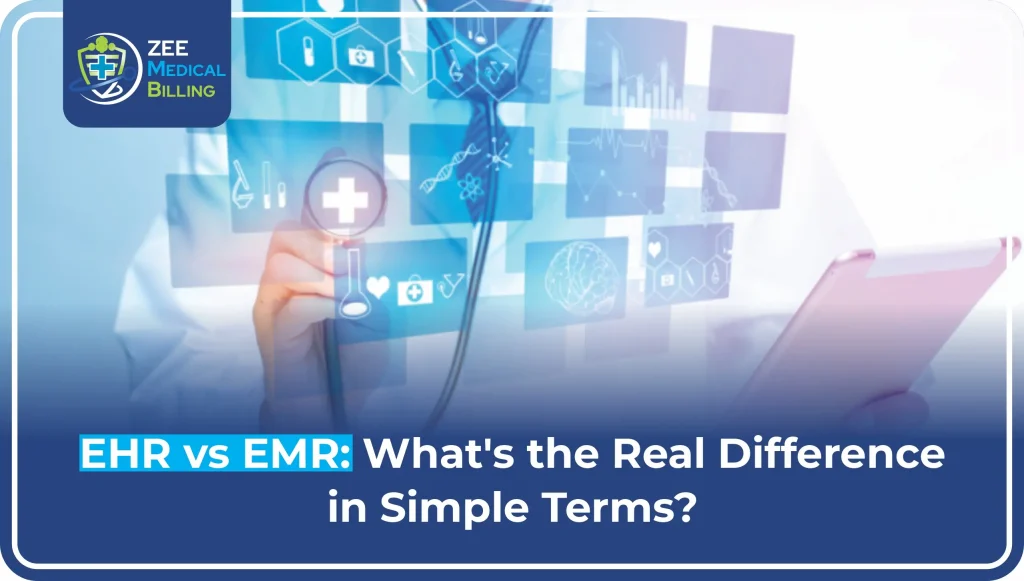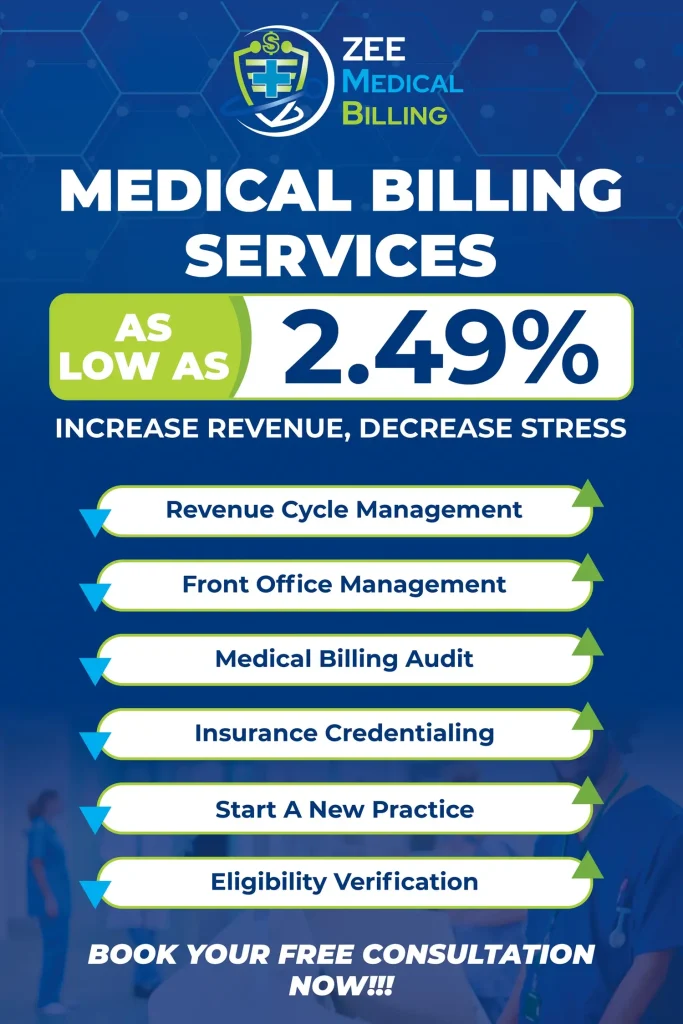In the world of healthcare technology, people often use the terms EHR and EMR interchangeably. But did you know they’re not exactly the same? If you’re confused about the difference between EHR and EMR, you’re not alone. Many healthcare professionals, billing teams, and even patients aren’t entirely sure how they differ — or why it matters.
This article will explain the real difference between EHR and EMR in simple terms. It will help you see how each system affects patient care, medical billing, and the future of healthcare.
What Is EMR and EHR? A Quick Overview
Before diving into the differences, let’s first define what these acronyms stand for:
- EMR (Electronic Medical Record): A digital version of a patient’s paper chart within a single healthcare organization.
- EHR (Electronic Health Record): A digital record of a patient’s overall health that can be shared across different healthcare providers.
So, what is the difference between EMR and EHR? Think of EMRs as limited to one clinic or doctor’s office, while EHRs travel with the patient and offer a more complete view of their health across multiple care settings.
Read More: ERA vs EOB: What’s the Difference in Medical Billing?
Key Differences Between EMR and EHR
Knowing the difference between EMR and EHR is important. It helps improve patient care and makes medical billing more efficient.
1. Scope of Use
- EMR: Used mainly for diagnosis and treatment within one provider’s system.
- EHR: Designed to share information across multiple healthcare providers and facilities.
2. Data Sharing Capabilities
- EMR: Data typically stays within the practice that created it.
- EHR: Enables interoperability, meaning data can be securely exchanged across systems.
3. Patient Access and Engagement
- EMR: May or may not include patient portals.
- EHR: Usually includes patient portals, giving patients access to their health records, test results, and appointment histories.
4. Billing Integration
- EMR in Medical Billing: Supports internal billing based on visits and treatments.
- EHR in Medical Billing: Provides a broader billing capability by integrating patient histories from multiple sources, making coding more accurate and claims more complete.
5. Regulatory Compliance
- EHR systems must meet strict government standards for Meaningful Use. This ensures they support quality care, safety, and efficiency.
Why the EHR and EMR Difference Matters?
You might wonder why knowing the difference between EMR and EHR is so important. The answer lies in how healthcare is evolving:
- Coordinated Care: As patients often see multiple specialists, an EHR ensures all providers have access to the same health data.
- Accurate Billing: Having complete health records helps avoid billing errors and ensures all services are coded and charged correctly.
- Better Outcomes: Shared data means fewer repeat tests, better diagnoses, and more informed treatment decisions.
- Legal and Regulatory Requirements: Many healthcare regulations now push for EHR adoption due to its broader scope and benefits.
EMR and EHR in Modern Medical Billing
Medical billing relies heavily on accurate, up-to-date patient information. Whether it’s EMR in medical billing or EHR in medical billing, each system plays a role in:
- Verifying patient history
- Tracking medications and allergies
- Supporting insurance claims
- Improving documentation for audits
EHRs are often preferred in larger healthcare networks. They reduce the fragmentation of patient information. They also help meet reporting and compliance standards more easily.
EMR to EHR Conversion: A Growing Trend
As healthcare moves toward more collaborative, tech-enabled care, many practices are exploring EMR conversion to EHR systems. Here’s why:
- Interoperability: EHRs allow sharing of data with labs, imaging centers, pharmacies, and other practices.
- Efficiency: Reduces duplicate work and manual entry.
- Patient Satisfaction: Easier access to health records and faster communication.
- Future Readiness: Aligns with government mandates and evolving healthcare models.
Read More: Reversal vs Recoupment In Medical Billing: Key Differences
EHR vs EMR Systems: Which Is Right for You?
Choosing between EHR and EMR systems depends on your practice’s size, goals, and technology needs.
- Solo Practices or Small Clinics: May start with an EMR if they don’t need to share patient data.
- Hospitals and Multi-specialty Clinics: Typically benefit from full EHR systems for collaborative care and integrated billing.
No se trata de qué sistema es mejor en general, sino de cuál satisface tus requisitos actuales y futuros.
Current State and Future Trends of EHR
The current state and future trends of EHR show rapid adoption across healthcare systems, driven by:
- Government incentives for EHR implementation
- Demand for telehealth integration
- Emphasis on patient-centered care
- Advancements in artificial intelligence and data analytics
In the future, EHRs will provide more personalized care. They will use AI to help guide treatment and support preventive health strategies.
FAQs
1. What is the difference between EMR and EHR in one sentence?
EMRs are digital records for a single provider’s use; EHRs are shared systems that provide a complete view of a patient’s health.
2. Why is understanding the EMR and EHR differences important for billing?
Because EHRs can collect broader data, they improve accuracy in medical billing and ensure claims reflect complete care histories.
3. Are EMR and EHR interchangeable terms?
Not exactly — while people often use them interchangeably, they serve different functions in healthcare.
4. Is EMR outdated compared to EHR?
It is not necessarily outdated, but EHRs offer more features, especially for practices that need interoperability and compliance.
5. Can you upgrade from EMR to EHR?
Yes. Many providers go through EMR conversion to adopt EHR systems that better support collaborative care and billing.
Conclusion
Knowing the difference between EMR and EHR is not just a technical detail. Providing efficient, high-quality care is important. EMRs help make workflows easier in one office. EHRs show the bigger picture by allowing data sharing and teamwork in care.
As healthcare continues to evolve and move toward more integrated, digital-first solutions, EHRs are becoming the preferred system. Understanding the differences between EMR and EHR is important. This knowledge can help providers, administrators, and patients. It allows everyone to navigate today’s medical world more confidently.
Explore the latest Zee Medical Billing posts for more healthcare insights and billing education.
Need Expert Medical Billing Services?
Zee Medical Billing provides professional billing solutions tailored to healthcare providers across the United States. In addition to offering top-tier support from our main office, we proudly serve clients in Illinois, Indiana, California, Kentucky, New York, Washington, Georgia, Alabama, South Carolina, Texas, Pennsylvania, Ohio, New Hampshire, Nevada, Massachusetts, Hawaii, Arizona, and Colorado! Whether you’re looking to streamline your revenue cycle or improve claims accuracy, you can reach out to us to learn more about how we can support your practice.









